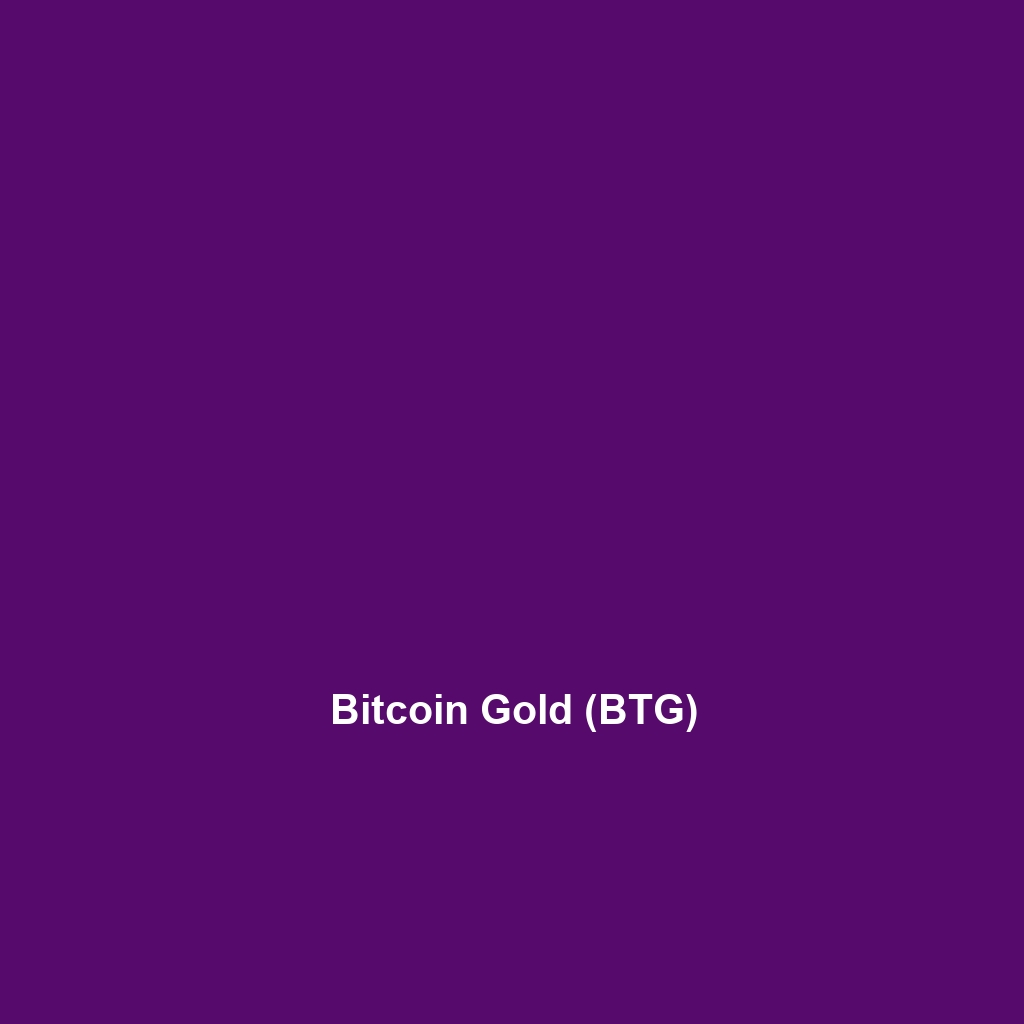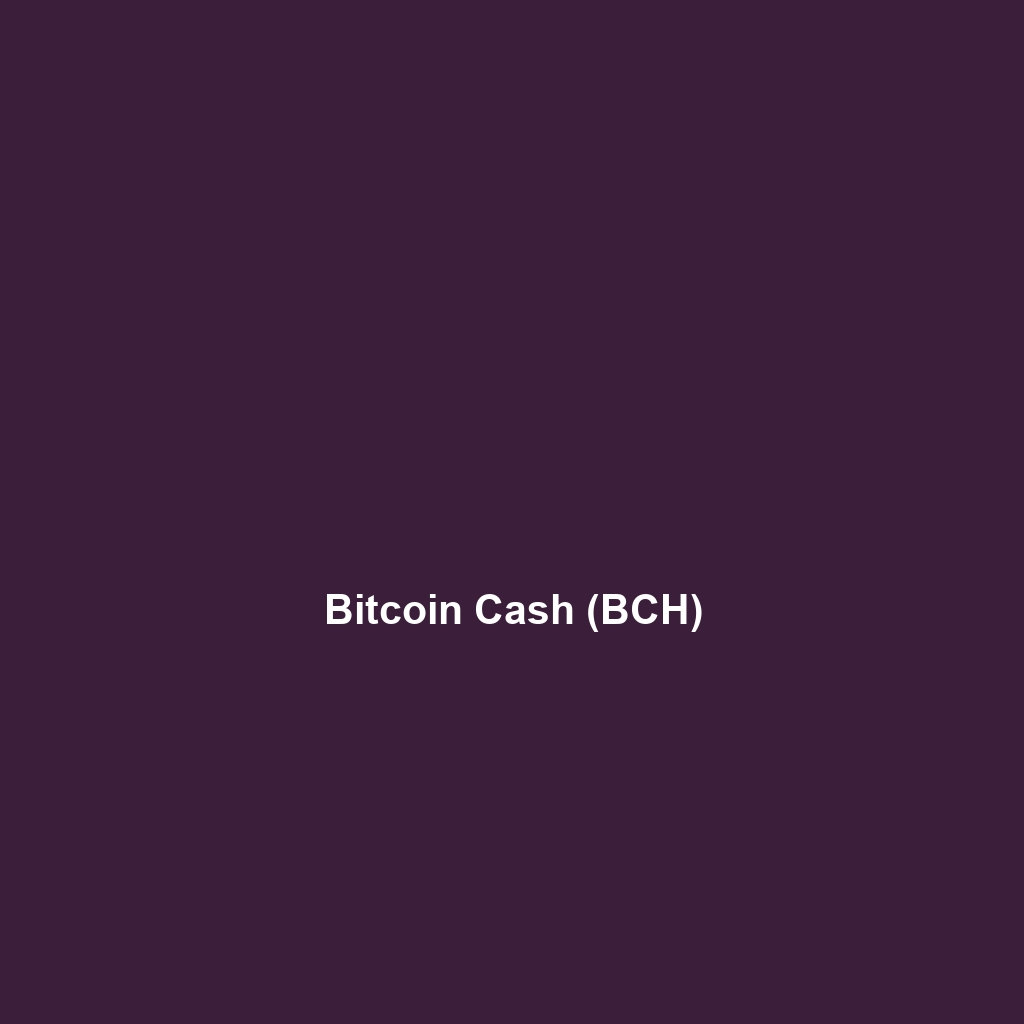Your cart is currently empty!
Tag: Bitcoin fork

Bitcoin Gold (BTG)
Bitcoin Gold (BTG): A Comprehensive Overview
Bitcoin Gold (BTG) is a notable cryptocurrency that has gained attention for its unique approach to decentralization and accessibility in the realm of digital currencies. Below, we delve into the key aspects of Bitcoin Gold to provide a thorough understanding of this cryptocurrency.
1. Name and Ticker Symbol
Bitcoin Gold operates under the ticker symbol BTG. This cryptocurrency is designed to be a decentralized, open-source digital currency that empowers individuals to own their financial future.
2. Founders, Launch Date, and History
Bitcoin Gold was launched in 2017 as a result of a hard fork from the original Bitcoin (BTC) blockchain. The key figures behind Bitcoin Gold include Jack Liao, who had a vision of making Bitcoin more decentralized by allowing ordinary users with standard PC hardware to mine it. Since its inception, Bitcoin Gold has reached significant milestones including its integration on various cryptocurrency exchanges and wallet platforms, enhancing its accessibility and adoption within the crypto community.
3. Blockchain Platform
Bitcoin Gold operates on its independent blockchain, branching off from the Bitcoin network. It is categorized as a layer 1 solution, which means it performs all operations on its original blockchain without relying on a secondary framework.
4. Purpose and Use Case
The primary purpose of Bitcoin Gold is to democratize the mining process and mitigate centralization, allowing users to mine the cryptocurrency using regular, consumer-grade hardware. Use cases for BTG include peer-to-peer payments, online transactions, and as a store of value, similar to Bitcoin, but with enhanced accessibility for miners.
5. Technology and Consensus Mechanism
Bitcoin Gold employs the Equihash algorithm as its consensus mechanism, which is designed to be ASIC-resistant. This encourages broader participation in the mining process, making it feasible for average users to mine Bitcoin Gold using GPUs, thus promoting decentralization.
6. Supply and Tokenomics
Bitcoin Gold has a maximum supply of 21 million coins, aligning with Bitcoin’s scarcity principle. As of now, the circulating supply is approximately 17 million BTG. There are no staking rewards or burn mechanisms integrated into Bitcoin Gold€„¢s tokenomics, focusing instead on mining rewards as the incentive for validators.
7. Use Cases and Adoption
Real-world applications of Bitcoin Gold include its use for payments and remittances across various online platforms. It is also being utilized by merchants seeking lower transaction fees compared to traditional financial systems. Partnerships with crypto payment processors like NOWPayments have further contributed to its adoption in e-commerce.
8. Market Performance and Metrics
Bitcoin Gold has seen fluctuating market cap and trading volume since its launch. As of the latest metrics, its market capitalization is approximately $200 million. Historical price trends reveal significant volatility, influenced by broader cryptocurrency market movements. Traders often monitor its performance for potential investment opportunities.
9. Where to Buy and Trade
Bitcoin Gold can be traded on various centralized exchanges (CEXs), including Binance, Bittrex, and Kraken. It is also available on decentralized exchanges (DEXs), which offer alternative trading opportunities for crypto enthusiasts.
10. Security and Risks
Bitcoin Gold has faced security vulnerabilities, including a significant 51% attack in 2020, which led to the loss of user funds and raised concerns within the community. Legal and regulatory risks also loom, as cryptocurrencies face scrutiny from governments worldwide.
11. Community and Governance
The governance model of Bitcoin Gold emphasizes community involvement. Decisions regarding upgrades and changes are made transparently, with discussions facilitated through forums and social media platforms. The engaged community is crucial for its continuous development and growth.
12. Competitors and Differentiation
Bitcoin Gold competes with similar projects like Bitcoin Cash (BCH) and Litecoin (LTC). However, its unique focus on decentralization through accessible mining sets it apart from these cryptocurrencies, which may require more specialized mining equipment.
13. Roadmap and Future Developments
The Bitcoin Gold team is committed to ongoing improvements, with plans for protocol updates and partnerships aimed at enhancing scalability and user experience. Future developments often include community-driven proposals that align with the goals of decentralization and security.
14. Wallet Compatibility
Bitcoin Gold is compatible with multiple wallets, including Ledger, Trezor, and various software wallets like Exodus and Jaxx. This compatibility enhances accessibility for users looking to store BTG securely.
15. Regulatory and Compliance Status
The regulatory status of Bitcoin Gold varies by region, reflecting the broader legal landscape for cryptocurrencies. Ongoing developments require users to stay informed about compliance requirements in their jurisdictions.
16. Recent News and Updates
Recent news surrounding Bitcoin Gold includes partnerships aimed at increasing its visibility in the crypto conversion sphere and ongoing discussions regarding potential upgrades to enhance its core functionalities and usability.
17. Summary and Call to Action
In summary, Bitcoin Gold represents a notable alternative to traditional cryptocurrencies, emphasizing decentralization and accessibility. Its commitment to facilitating mining for everyday users makes it a distinctive player in the cryptocurrency space. For those interested in exploring new investment opportunities in crypto, Bitcoin Gold is worth following closely.
For additional insights, visit UpCube.net. Also, check out the cryptocurrency€„¢s official website for the latest updates and comprehensive information.

Bitcoin Cash (BCH)
Bitcoin Cash (BCH): A Comprehensive Overview
Bitcoin Cash (BCH) is a prominent cryptocurrency that emerged as a fork of Bitcoin (BTC) in 2017, aimed at offering faster and less expensive transactions. As the crypto space continues to evolve, Bitcoin Cash strives to provide users with a reliable and efficient alternative to traditional payment systems.
1. Name and Ticker Symbol
Bitcoin Cash is the official name of the cryptocurrency, and it is commonly represented by the ticker symbol BCH.
2. Founders, Launch Date, and History
Bitcoin Cash was created by a group of developers including Amaury Séchet and others. It was launched on August 1, 2017, following a hard fork from the original Bitcoin blockchain. This fork was initiated in response to growing concerns over Bitcoin’s scalability issues, primarily related to high transaction fees and slow processing times experienced at peak usage. Since its inception, Bitcoin Cash has had several notable milestones, including its own forks, Bitcoin SV (Satoshi Vision) in 2018, and ongoing upgrades to enhance its network capabilities.
3. Blockchain Platform
Bitcoin Cash operates on its own dedicated blockchain, derived from Bitcoin’s codebase. The BCH blockchain is classified as a Layer 1 solution, meaning it processes transactions directly on its primary network without the requirement for second-layer protocols.
4. Purpose and Use Case
The primary purpose of Bitcoin Cash is to serve as a peer-to-peer electronic cash system, offering users a means of transferring value quickly and affordably. Use cases include everyday transactions, remittances, and micropayments, making it an appealing choice for businesses and consumers seeking to utilize cryptocurrency for daily purchases.
5. Technology and Consensus Mechanism
Bitcoin Cash employs the Proof of Work (PoW) consensus mechanism, similar to Bitcoin. This process ensures that transactions are validated and added to the blockchain through complex computational tasks performed by miners, which requires substantial energy and resources. The PoW mechanism underlines the security and integrity of the BCH network.
6. Supply and Tokenomics
The total supply of Bitcoin Cash is capped at 21 million BCH, mirroring Bitcoin’s supply limits. As of October 2023, the circulating supply is approximately 19 million BCH. Unlike some newer cryptocurrencies, BCH does not have staking rewards or burn mechanisms; however, the transaction fees provide incentives to miners who validate transactions.
7. Use Cases and Adoption
Bitcoin Cash is accepted by a diverse range of merchants and service providers worldwide. It has seen partnerships with payment processors like BitPay and CoinGate, enabling businesses to integrate BCH into their payment systems easily. BCH also participates in various decentralized finance (DeFi) projects, broadening its utility in the evolving crypto landscape.
8. Market Performance and Metrics
Bitcoin Cash has historically had a fluctuating market performance. As of now, BCH’s market capitalization is estimated at around $5 billion, placing it within the top 20 cryptocurrencies globally. Price trends show substantial volatility, with BCH experiencing significant highs and lows since its launch, making it an attractive market for crypto trading enthusiasts.
9. Where to Buy and Trade
BCH can be traded on several cryptocurrency exchanges, including major platforms like Binance, Coinbase, and Kraken. As a popular asset, it is also available on decentralized exchanges (DEXs) like Uniswap.
10. Security and Risks
While Bitcoin Cash has demonstrated a stable performance over the years, it faces potential security vulnerabilities, including risks related to 51% attacks, common in PoW systems. Additionally, the cryptocurrency space confronts regulatory uncertainties, which can impact BCH’s adoption and market dynamics.
11. Community and Governance
Bitcoin Cash’s governance model leans towards community engagement and open-source principles. Decisions regarding important upgrades and changes to the protocol are determined by community consensus, including miners, developers, and users, fostering a democratic approach to governance.
12. Competitors and Differentiation
Bitcoin Cash competes with other cryptocurrencies like Bitcoin, Litecoin, and other payment-focused cryptos. Its significant differentiator is its larger block size limit, which allows for faster processing times and lower transaction fees compared to Bitcoin. This advantage positions BCH as a viable alternative for users seeking efficient digital payments.
13. Roadmap and Future Developments
The roadmap for Bitcoin Cash includes continuous improvements aimed at enhancing user experience and scalability. Future developments focus on expanding merchant adoption and exploring innovative use cases in DeFi and beyond. Ongoing upgrades, such as adjustments to its consensus rules, are also planned to keep the network responsive to user needs.
14. Wallet Compatibility
Bitcoin Cash is supported by a variety of wallets, including software wallets like Electrum and hardware wallets such as Ledger and Trezor. These wallets provide users with secure storage options for managing their BCH assets.
15. Regulatory and Compliance Status
Bitcoin Cash has experienced its share of legal scrutiny, encompassing regulations from various jurisdictions that can impact its use and adoption. Staying compliant with local regulations remains critical for BCH as governments around the globe develop frameworks to govern cryptocurrency usage.
16. Recent News and Updates
As of late 2023, Bitcoin Cash has made headlines with several successful partnerships aimed at expanding its use within the e-commerce sector. The implementation of new technological enhancements has also been announced, focusing on optimizing transaction speeds and lowering costs.
17. Summary and Call to Action
In summary, Bitcoin Cash (BCH) represents a significant innovation in the cryptocurrency space, offering advantages that cater to users looking for a reliable digital cash solution. With its robust technology, real-world use cases, and strong community involvement, BCH is positioned to remain a relevant player as the blockchain landscape evolves. For those interested in exploring this cryptocurrency, it€„¢s worth following its developments closely.
For additional insights, visit UpCube.net. Learn more about Bitcoin Cash by visiting its official website.